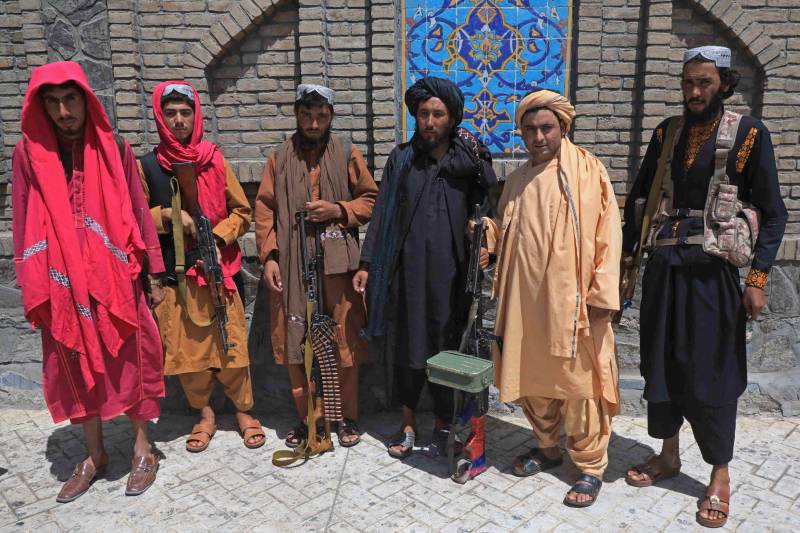Afghan soldiers seek Taliban amnesty after fall of Herat
Warlords give up to Taliban with surprising ease

Stay tuned with 24 News HD Android App

Thousands of Afghan soldiers thronged the governor's office in the western city of Herat looking for the Taliban -- not to battle them but to seek amnesty.
Afghanistan's third-biggest city fell without a fight on Thursday as government forces retreated and Herat's famous warlord Ismail Khan was detained by the insurgents.
With fears of violent reprisals growing as the Taliban get closer to a full takeover of the country, Afghan soldiers in Herat -- nearly all of them in civilian clothes -- gathered Saturday to try and get a letter of amnesty.
Inside the office that once housed the Herat governor, Taliban members sat on couches -- some cradling American military rifles -- as they jotted down names and reviewed lists spread on a glass-top coffee table.
On stationery with the Taliban letterhead, one wrote amnesty notes -- some long-term, some valid for just a few days.
One Afghan soldier at the compound told AFP that his unit was surrounded by the Taliban before the fall of the city.
Now he just wanted security.
"I have come here to get an amnesty letter to go out of the city," said Ahmed Shahidi. "Until I find a place where I can stay safe in the future."
Taliban member Najeebullah Karokhi said around 3,000 people were given amnesty.
"Those who are from other provinces will be provided a three-day temporary amnesty letter so they can get to their home provinces, where they need to get another long-term amnesty letter from our officials," he said.
In the shaded part of a courtyard on the compound, hundreds sat patiently as a man holding amnesty slips shouted names one by one for them to be collected.
The banal bureaucratic process belied the shocking speed and efficiency of the Taliban's victories across Afghanistan.
Just weeks ago, a defiant and angry Ismail Khan -- who ruled Herat as his fiefdom -- had vowed to defend the city with his militia, and called on government forces to show more backbone.
But the city's defences seemingly evaporated overnight as troops retreated to a base outside the city and Khan was captured by the Taliban.
The warlord's spokesman said he had been allowed to return to his residence following talks with the Taliban, but it was unclear exactly what deal had been cut between the two.
"We had to leave the city in order to prevent further destruction," a senior government security source from Herat told AFP.
The fear of Taliban revenge is not unfounded: the insurgents have imposed brutal punishments on opponents, and anyone who violated their harsh brand of Islamic law when they were in power from 1996 to 2001.
They have recently been accused of committing war crimes, including massacres of civilians and soldiers outside combat.
The insurgents deny committing such atrocities.
Afghan warlords capitulate
Afghanistan's warlords vowed defiantly to defend their strongholds from the Taliban and crush the insurgents. But, like the government's forces, they too gave up with surprising ease.
As the insurgents swept through the north in a surprise offensive targeting Afghanistan's anti-Taliban bastion, President Ashraf Ghani called for a national mobilisation of militia forces.
Despite Ghani's chequered history with the country's warlords, the beleaguered president was hoping they could help turn the tide.
In the besieged northern city of Mazar-i-Sharif, Ghani was looking to longtime strongman Atta Mohammad Noor and ethnic Uzbek warlord Abdul Rashid Dostum.
Both were known for their dogged defence against the Taliban in the 1990s, and had remained influential figures during the past two decades of war.
In the days leading up to their defeat, the greying commanders appeared to be the fearsome figures from their younger years.
"The Taliban never learn from the past," Dostum told reporters last week after flying back to Mazar-i-Sharif, while offering a not-so-subtle reference to the alleged massacre of the insurgents by his fighters in 2001.
"The Taliban have come to the north several times but they were always trapped. It is not easy for them to get out."
Noor took to social media to issue his own warnings, posting graphic pictures of Taliban killed by his troops while promising to fight to the death.
"I prefer dying in dignity than dying in despair," wrote Noor on Twitter, alongside other defiant posts vowing to "defend the nation".
In a video posted to Facebook on Saturday, Noor spoke calmly to camera dressed in military fatigues while rifle fire could be heard close by.
- 'Cowardly plot' -
Ultimately, bravado did not beat back the insurgents.
Late Saturday, both men's militias were routed after the Afghan military units they were supporting surrendered to the Taliban.
Dostum and Noor fled across the nearby Uzbek border.
Noor claimed they had been the victims of deep-seated betrayal, saying on Twitter their resistance came to an end "as a result of a big organised & cowardly plot".
He offered no other details.
Video posted on pro-Taliban social media accounts, meanwhile, showed a group of young Taliban fighters combing through Dostum's gaudy residence, digging through cabinets and testing out overstuffed furniture.
Their rout came days after fellow strongman Ismail Khan was captured by Taliban fighters in the western city of Herat.
Khan had in the lead-up to his defeat sounded like the same powerful figure who had ruled his fiefdom with such authority for decades that he earned the nickname "Lion of Herat".
"We demand all the remaining security forces resist with courage," Khan said last month.
But with a look of resignation, Khan was on Friday forced to pose for pictures with Taliban fighters and give an interview to an insurgent media outlet.
After all the hefty promises and chest-thumping, it was a humiliating end.
